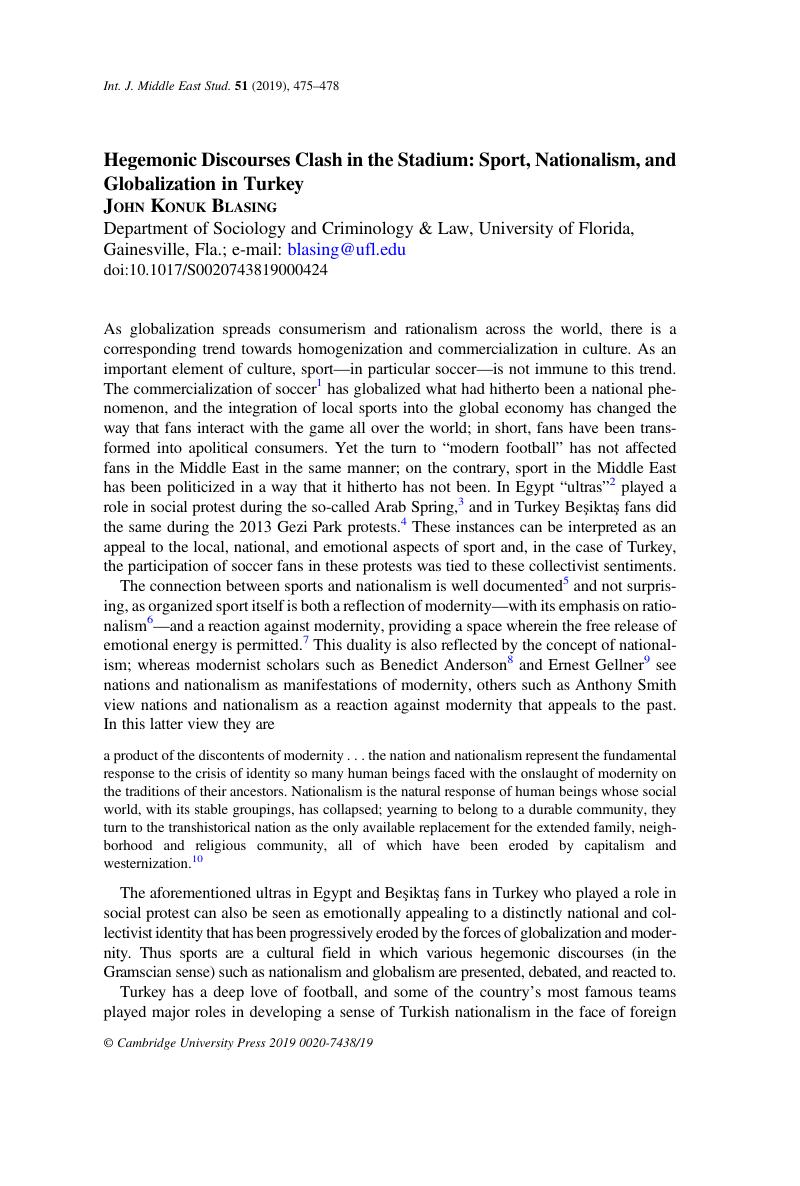No CrossRef data available.
Article contents
Hegemonic Discourses Clash in the Stadium: Sport, Nationalism, and Globalization in Turkey
Published online by Cambridge University Press: 02 August 2019
Abstract

- Type
- Roundtable
- Information
- Copyright
- Copyright © Cambridge University Press 2019
References
NOTES
1 For a discussion of the commercialization of Turkish football, see Emrence, Cem, “From Elite Circles to Power Networks: Turkish Soccer Clubs in a Global Age, 1903–2005,” Soccer & Society 11 (2010): 242–52CrossRefGoogle Scholar. For a discussion of commercialization as it relates to the fans of Istanbul's Beşiktaş specifically, see McManus, John “Been There, Done That, Bought the T-Shirt: Beşiktaş Fans and the Commodification of Football in Turkey,” International Journal of Middle Eastern Studies 45 (2013): 3–24CrossRefGoogle Scholar. For a discussion of similar trends in Israel, see Porat, Amir Ben, “From Community to Commodity: The Commodification of Football in Israel,” Soccer & Society 13 (2012): 443–57CrossRefGoogle Scholar.
2 The ultras are “hardcore” soccer fans described by Vincenzo Scalia as “organized groups with an independent subculture that enjoys the legitimacy of other football supporters.” Scalia, Vincenzo, “Just a Few Rogues? Football Ultras, Clubs, and Politics in Contemporary Italy,” International Review for the Sociology of Sport 44 (2009): 41–53CrossRefGoogle Scholar.
3 See Dorsey, James, “Pitched Battles: The Role of Ultra Soccer Fans in the Arab Spring,” Mobilization 17 (2012): 411–18Google Scholar; El-Zatmah, Shawki, “From Terso into Ultras: The 2011 Egyptian Revolution and the Radicalization of Soccer's Ultra-Fans,” Soccer & Society 13 (2012): 801–13CrossRefGoogle Scholar; and Woltering, Robert “Unusual Suspects: ‘Ultras’ as Political Actors in the Egyptian Revolution,” Arab Studies Quarterly 35 (2013): 290–304CrossRefGoogle Scholar.
4 See Turan, Ömer and Özçetin, Burak, “Football Fans and Contentious Politics: The Role of Çarşı in the Gezi Park Protests,” International Review for the Sociology of Sport 54 (2019): 199–217CrossRefGoogle Scholar.
5 Bairner, Alan, Sport, Nationalism, and Globalization: European and North American Perspectives (Albany, N.Y.: State University of New York Press, 2001)Google Scholar.
6 Guttmann, Allen, From Ritual to Record: The Nature of Modern Sports (New York: Columbia University Press, 2004)Google Scholar.
7 Elias, Norbert and Dunning, Eric, Quest for Excitement: Sport and Leisure in the Civilizing Process (Oxford: Basil Blackwell, 1986)Google Scholar.
8 Anderson, Benedict, Imagined Communities: Reflections on the Origin and Spread of Nationalism (London: Verso, 2001)Google Scholar.
9 Gellner, Ernest, Nations and Nationalism (Oxford: Blackwell, 2006)Google Scholar.
10 Smith, Anthony D., Nationalism and Modernism: A Critical Survey of Recent Theories of Nations and Nationalism (London: Routledge, 1998), 97Google Scholar.
11 For more on this in the context of Izmir specifically, see Akın, Yiğit, ed., KafSinKaf (Istanbul: İletişim, 2010)Google Scholar; Diker, Ahmet, Direnişten Dirilişe: Kaf Sin Kaf Destanını Yazanlar (Izmir: Duvar Yayınları, 2014)Google Scholar; and Altay Izmir Spor Tarihi (Izmir: Acargil Matbaasi, n.d.). See also Kozanoğlu, Can, “Beyond Edirne: Football and the National Identity Crisis in Turkey,” in Football Cultures and Identities, ed. Armstrong, Gary and Giulianotti, Richard (Basingstoke, UK: Macmillan, 1999): 117–25CrossRefGoogle Scholar
12 Tuğal, Cihan, Passive Revolution: Absorbing the Islamic Challenge to Capitalism (Stanford, Calif.: Stanford University Press, 2009)Google Scholar.
13 Turan and Özçetin, “Football Fans and Contentious Politics.”
14 Tuğal, Cihan, The Fall of the Turkish Model: How the Arab Uprisings Brought Down Islamic Liberalism (London: Verso, 2016), 149Google Scholar.
15 This is well documented by Anita Oğurlu and Ahmet Öncü who point out that “an apparent Islamist versus laic ideological split is in effect the façade against the actual class struggle within the dominant class between the Islamist and laic factions.” Oğurlu, and Öncü, , “The Laic-Islamist Schism in the Turkish Dominant Class and Media,” in The Neoliberal Landscape and the Rise of Islamist Capital in Turkey, ed. Balkan, Neşecan, Balkan, Erol, and Öncü, Ahmet (New York: Berghahn, 2015), 275Google Scholar.
16 As Tuğal observes, “The Gezi revolt provided a noncommodified space (the barricades, the public park, shared meals) where [the protestors] momentarily tasted the fruits of a collectivistic life”; Tuğal, The Fall of the Turkish Model, 260.
17 Jameson, Fredric, Postmodernism: Or, The Cultural Politics of Late Capitalism (Durham, N.C.: Duke University Press, 1991)Google Scholar. For an example of how this relates to Turkish football, see Battini, Adrien “Reshaping the National Bounds through Fandom: The UltrAslan of Galatasaray,” Soccer & Society 13 (2012): 701–19CrossRefGoogle Scholar.
18 Raab, Alon, “Soccer in the Middle East: An introduction,” Soccer & Society 13 (2012): 619–38CrossRefGoogle Scholar.
19 See John Konuk Blasing, “Half Built Stadiums and Promises Left Unkept: Turkey's Political Landscape Seen through Stadiums,” thisisfootballislife, 12 June 2015, accessed 28 March 2019, https://thisisfootballislife.com/2015/06/12/half-built-stadiums-and-promises-left-unkept-turkeys-political-landscape-seen-through-stadiums/; John Konuk Blasing, “Besiktas’ New Stadium Opens as a Political Event: What's In a Name?,” thisisfootballislife, 12 April 2016, accessed 28 March 2019, https://thisisfootballislife.com/2016/04/12/besiktas-new-stadium-opens-as-a-political-event-whats-in-a-name/.
20 This e-ticketing scheme also represents the trend towards a surveillance society reflecting Foucauldian panopticism, as all fans who enter the stadium are tracked via their citizenship numbers attached to their Passolig cards.




